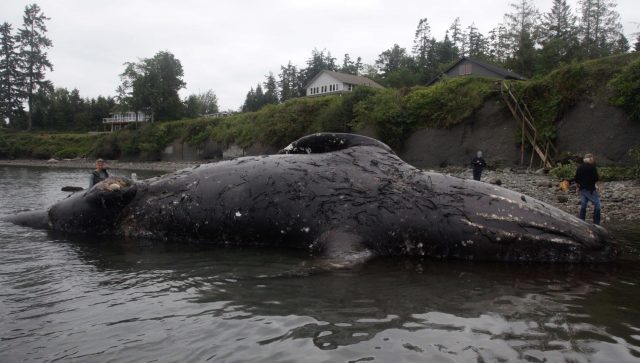
PORT ANGELES — With more gray whale carcasses washing up onto northwest beaches than we’ve seen in two decades, the National Oceanic and Atmospheric Administration (NOAA) Fisheries says it has run out of appropriate places to take them for decomposition.
In response, the agency has asked landowners to volunteer their beachfront property as a disposal site for the carcasses, and the first takers are a couple living along a rocky beach in Port Hadlock.
Landowners Mario Rivera and Stefanie Worwag had the 40-foot gray whale towed to their beach last week. The cause of death for the abnormally skinny whale was the same as others in the current die-off, namely, malnutrition from not getting fat enough last year on the feeding grounds in the Arctic.
NOAA Fisheries spokesman Michael Milstien says after the Port Hadlock couple stepped up, others have joined in.
“Well, as word gotten out about our request we’ve had a roughly ten or so people who volunteered waterfront property and they range all across the the Salish Sea, so it’s diverse geographically and gives us potentially some new options, if more whales strand, depending on of course where that happens.”
The beachfront the Jefferson County couple offered was suitable because they own a large parcel with few neighbors in close proximity. A 40-foot-long whale is a lot to decay, but it’s a natural process of the marine environment, and the skeletons left behind become the property of the landowner, should they choose to use them for education or display.
“You know, it’s a natural process that takes place. We’re fortunate to have whales like this living in our backyard, but part of the consequence of that is that they sometimes die and and we see that part of their life cycle as well. And they’ve been experimenting with lime that can be placed on the carcass, which is apparently helping with the smell as well as speeding up the decomposition and it’s also benign to the environment. So there isn’t a concern there.”
Milstien points out that the gray whale population appears to be strong with an estimated 27,000 individuals, and says that after a similar die-off in 1999/2000, the population recovered quickly.
About 30 whales have stranded on Washington beaches this year, and about 70 on the west coast overall.
Photo: Mario Rivera
